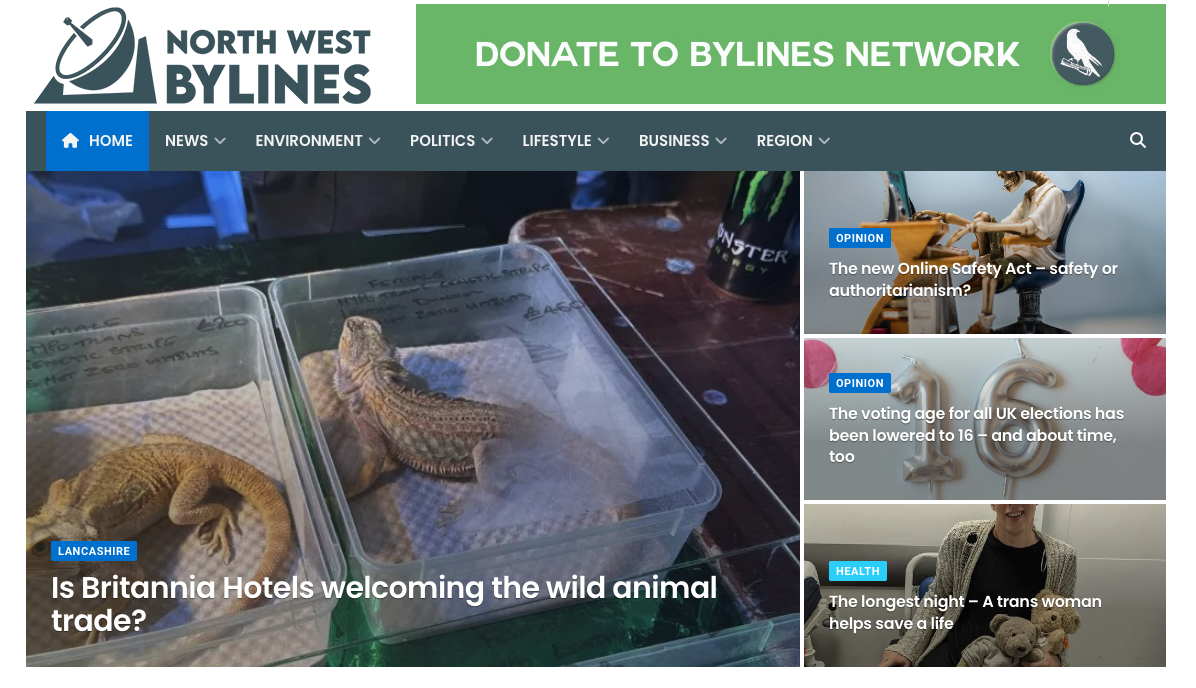On 10 August 2025, a large-scale market in reptiles and amphibians is poised to take place at the Norbreck Castle Hotel in Blackpool. It is feared that this will not be a benign gathering of enthusiasts, but instead a scene of unscrupulous trade, where around one hundred stallholders are expected to display wild animals for sale. Thousands of sentient beings, including snakes, lizards and frogs, each capable of feeling fear, pain and stress would then be reduced to mere merchandise.
Blackpool council has warned the venue that trading animals would be illegal
The venue, part of the Britannia Hotels chain – a company already saddled with the title of Britain’s worst for eleven consecutive years – has been warned by Blackpool Council that the event will be monitored by Council officers for any impropriety. The Norbreck Castle Hotel has been advised that the planned event is likely to involve criminal activity, specifically the trading of pet animals from market stalls.
Blackpool council officials gave North West Bylines this statement:
Blackpool Council Spokesperson, said: “Following correspondence received from the Animal Protection Agency the council contacted the Norbreck Castle to discuss the event.
“If the reptile event goes ahead, Council Officers will be present to monitor compliance. In addition, animal welfare officers will be in attendance to safeguard the wellbeing of all animals involved. Should any unlawful activity be identified, appropriate enforcement action will be taken.”
This practice was outlawed in 1983 (in an amendment to the Pet Animals Act 1951) based on the acceptance that the welfare of these animals is incompatible with the temporary and makeshift nature of a market. The hotel’s response? A deafening silence, while the event continues to be promoted by its organisers.
At these markets, reptiles and amphibians are commonly crammed into plastic tubs barely larger than the animals themselves.
These are not domesticated companions that have evolved over millennia to share our homes. They are wild animals, whose fundamental biological needs – including finely controlled temperature and humidity that mimics their wild environment – are casually ignored for the sake of convenience. Packaged, transported, repeatedly handled, and exposed to noise, vibrations and invasive glare, these animals are subjected to cumulative stress levels that can ultimately be lethal.
Breeders meetings, shows or plain markets?
Organisers describe these events as ‘breeders’ meetings’ or ‘shows’. But the sheer volume of animals and the prices they sell for, as well as the industrial scale at which some of the traders operate, expose this pretence. Many sellers have purpose-built facilities, offer payment plans or export animals to other countries.
Animal traders often display split personalities in their business practices. They happily project the appearance of professional businesses on their selling platforms, proudly displaying logos and branding. Then, at the behest of market organisers, they disingenuously claim ‘hobbyist’ status, whilst chameleon-like camouflaging the true nature of their production line breeding programmes. This is often accompanied by shrieks of injustice at any suggestion that they should be subjected to the same regulatory oversight as any other commercial venture.
Cash is king, so payments can’t be traced
At reptile and amphibian markets, anything that indicates commercial activity is stripped away: banners, business cards and logos are not permitted by the organisers. Card machines are forbidden. Cash is king. This is all about disguising the commercially-driven nature of these events so as not to attract the attention of enforcement authorities.
It is a cash-in-hand, no-questions-asked system that operates as a brazen affront not only to animal welfare, but to public accountability, consumer rights, and the rule of law itself, raising stark possibilities of mass tax evasion and money laundering.
Enforcement duty falls to local councils, which are oftenunprepared to deal with these pop-up markets. Councils first must navigate Defra’s guidance, which is so riddled with ambiguity as to be functionally useless. They then must discern whether animal sellers at these events are private individuals selling their own surplus pets or commercial enterprises. The system demands a definitive answer but councils often do not have the resources to gather the necessary evidence. This creates an impasse that allows the trade to flourish in the grey areas.
The show was banned from several other locations
The organiser of the event billed to take place at the Norbreck Castle Hotel is the International Herpetological Society (I.H.S). Since leaving its longstanding venue at the Doncaster Racecourse, the I.H.S. has become a pariah in search of a home, having had an event cancelled by a Bradford venue in June this year and after being turned away by numerous other venues. Yet where others see moral and legal red lines, Britannia Hotels seemingly sees only a commercial opportunity.
The law is not ambiguous. The scientific evidence of animal suffering at these events is overwhelming. The public opposition is clear and justified. The Animal Protection Agency (APA), alongside World Animal Protection and Freedom for Animals, demand that Britannia Hotels confronts its corporate responsibility. They must not allow their premises to become a haven for a sordid and illicit trade. They must cancel this event, and they must do it now. Anything less is to declare themselves willing facilitators of criminal activity.
Britannia Hotels and the International Herpetology Society were approached by email and asked to clarify how they could justify this event. They haven’t answered by the date of publication of this article.

